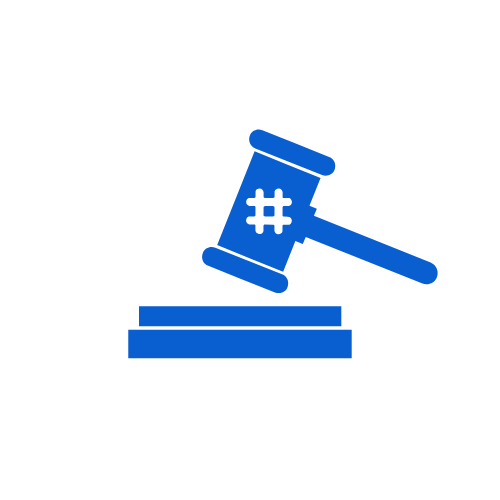The internet feels like a free space where we can share thoughts, opinions, and content without much worry. But the truth is, what you post online isn’t always free from legal consequences. Over the years, I’ve seen people face lawsuits over tweets, Facebook comments, YouTube videos, and even memes.
I used to think that as long as I wasn’t breaking the law in an obvious way, I’d be fine. But as I started learning more about internet law and digital rights, I realized just how easy it is to cross a legal line without realizing it.
So, can you really get sued for something you post online? The answer is yes—and it happens more often than you think. Let’s break down the main legal risks associated with online posts and how to protect yourself from potential lawsuits.
1. Defamation: The Danger of False Statements
One of the most common reasons people get sued for online content is defamation. This happens when someone makes a false statement about another person or business that damages their reputation.
Defamation Laws Explained:
✔ Libel – Written false statements (tweets, blog posts, social media comments).
✔ Slander – Spoken false statements (live streams, videos, podcasts).
For example, if someone falsely accuses a business of illegal activities in a Facebook post and it causes that business to lose customers, they could sue for defamation.
How to Avoid Defamation Lawsuits:
- Stick to the facts – If you’re making claims about a person or business, ensure they’re backed by verifiable evidence.
- Use opinion disclaimers – Instead of saying, “This company scams people,” say, “In my experience, I didn’t find their services helpful.”
- Be mindful of exaggeration – Even casual jokes or sarcastic comments can be misinterpreted as false statements.
2. Copyright Infringement: Using Someone Else’s Content Without Permission
I see copyright violations happen online all the time, and often, people don’t even realize they’re breaking the law. Just because something is on the internet doesn’t mean it’s free to use.
What Counts as Copyright Infringement?
❌ Using someone’s photos, music, or videos without permission.
❌ Copying and pasting articles or blog posts without giving credit.
❌ Posting copyrighted material (movies, songs, artwork) on social media.
Even memes, gifs, and viral videos are often copyrighted, and some companies are aggressive about enforcing their rights.
How to Avoid Copyright Lawsuits:
- Use royalty-free or Creative Commons images/videos from sites like Unsplash or Pexels.
- Always credit the original creator if you share copyrighted work.
- Request permission before using someone else’s work for commercial purposes.
Many social media platforms have built-in copyright detection systems that can take down your content automatically, but that doesn’t mean a lawsuit isn’t possible.
3. Harassment, Threats, and Cyberbullying
Many people don’t realize that online harassment can have legal consequences. What might seem like a heated argument or joke can actually lead to criminal charges or civil lawsuits.
What Could Be Considered Online Harassment?
❌ Sending threatening messages or inciting violence against someone.
❌ Repeatedly insulting, stalking, or doxxing (sharing personal info) of an individual.
❌ Engaging in group harassment campaigns (coordinating online attacks).
Many countries and states have strict laws against cyberbullying and online threats. Some offenses could even lead to criminal charges, not just civil lawsuits.
How to Stay Safe from Legal Trouble:
- Think before you post – If you wouldn’t say it in person, don’t say it online.
- Don’t engage in online fights – Heated arguments can escalate and be used against you.
- Avoid sharing personal details of others – Even exposing someone’s address, workplace, or private messages can be illegal.
4. Breaching Confidentiality & Leaking Private Information
If you work for a company, have access to confidential data, or sign a non-disclosure agreement (NDA), posting sensitive information online can lead to serious legal trouble.
Examples of Confidentiality Breaches Online:
❌ Posting screenshots of internal company emails or documents.
❌ Leaking customer or employee information on social media.
❌ Sharing behind-the-scenes company secrets (products, projects, finances).
Even accidental leaks can result in lawsuits, so it’s crucial to think before sharing private or workplace-related content.
How to Avoid Legal Risks:
- Keep work-related discussions private—Don’t post about clients, projects, or workplace disputes.
- Read contracts before posting—If you’ve signed an NDA, know your legal obligations.
- Respect other people’s privacy—Avoid exposing personal conversations or confidential info online.
5. Trademark Violations & False Advertising
Businesses and content creators need to be especially careful about trademark laws and misleading claims. If you run an online shop, social media brand, or marketing campaign, you could face legal consequences if you’re not careful.
Legal Risks for Online Businesses:
🚨 Trademark Infringement – Using a brand name, logo, or slogan that belongs to another company.
🚨 False Advertising – Making exaggerated or misleading claims about a product/service.
🚨 Unfair Competition – Trying to damage a competitor’s business through false accusations.
How to Stay Legally Safe as a Brand or Creator:
- Check trademarks before naming your brand or using logos.
- Avoid misleading language in ads or product descriptions.
- Follow FTC guidelines for sponsored content and influencer marketing.
Even influencers have been sued or fined for failing to disclose sponsorships properly, so transparency is key.
Final Thoughts: Think Before You Post
The internet might feel like a casual, free-for-all space, but the law still applies to digital content. If you:
✅ Post fact-based and verifiable content.
✅ Avoid making false claims about people or businesses.
✅ Credit creators and avoid copyright infringement.
✅ Steer clear of online harassment or personal data leaks.
✅ Ensure your business or brand follows advertising laws.
… then you’ll greatly reduce your chances of legal trouble.
I’ve learned that being careful, thoughtful, and legally aware online isn’t about censorship—it’s about protecting yourself. Before hitting “post,” take a moment to ask yourself: “Could this be legally risky?” If the answer is yes, it might be better to rethink or reword your message.
What are your thoughts on legal risks in online posting? Let’s discuss in the comments! ⚖️💻✨

